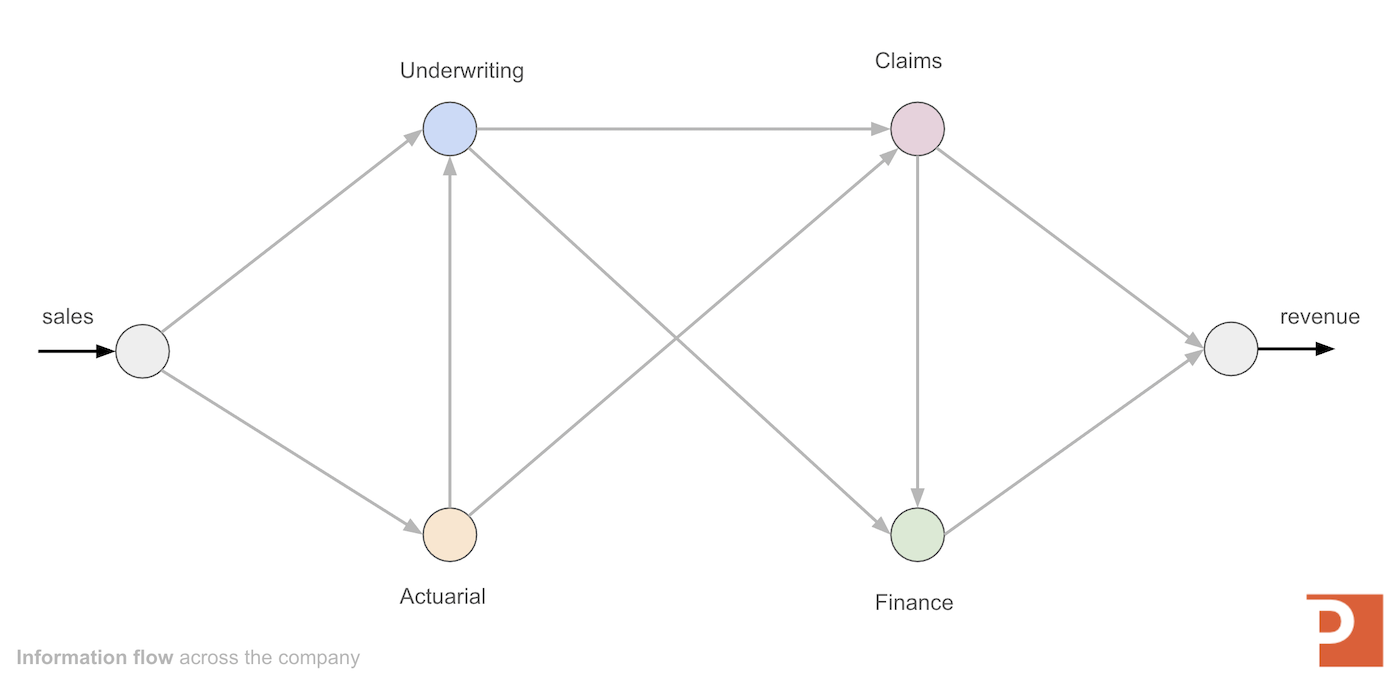The Red Queen's Game
"Well, in our country," said Alice, still panting a little, "you'd generally get to somewhere else—if you run very fast for a long time, as we've been doing."
"A slow sort of country!" said the Queen. "Now, here, you see, it takes all the running you can do, to keep in the same place. If you want to get somewhere else, you must run at least twice as fast as that!"
Strategic growth requires deliberate investment in technology, particularly in enhancing how information is processed across the organization. In service-based industries like insurance, growth is increasingly tied to improving the efficiency of knowledge work—those non-labor-output tasks that transform raw data into business outcomes.

As information flows through various business units, it is continuously refined and acted upon, driving core objectives such as revenue generation. Technology that supports and accelerates this information flow becomes essential not only for operational efficiency but also for sustaining a competitive edge.
Historically, service businesses relied heavily on manual processes to manage and interpret data. While foundational, these methods were slow, error-prone, and lacked standardization. Today, software-driven operations are no longer optional—they are the baseline for viability. To remain competitive, companies must move beyond simply adopting technology; they must continuously invest in and evolve their digital capabilities.
The Productivity Treadmill
As companies grow, the ability to efficiently process and act on information becomes central to both operations and competitive strategy. In today’s digital environment, software is the primary mechanism through which information is transformed and scaled. This transformation—what economics refers to as "technical change"—is achieved by improving the efficiency of individual tasks or enhancing coordination across teams.
Tools like spreadsheets, databases, business intelligence platforms, and AI systems have become foundational to knowledge work, enabling organizations to produce insights, make decisions, and respond to market demands faster and more effectively.
However, the baseline for remaining competitive is constantly shifting. Simply adopting software is no longer a differentiator—it’s table stakes. The real advantage lies in how well an organization applies the right software tools to accelerate information processing better than its peers.
In this environment, where knowledge work functions as the modern equivalent of manufacturing, the speed and precision with which a company transforms information determines its productivity. Sustained competitiveness requires constant reinvestment in better tools, smarter workflows, and innovative applications of technology—this is the "Productivity Treadmill" that defines success in modern industries.
To beat the competition we have to create information processing advantages through technology innovation. The other competitors in the market will attempt to do the same, continuing to make certain investments (e.g., "spreadsheets") the "table stakes" of productivity.
We have to continually find ways to create knowledge work technical change on the collective productivity treadmill.
This is the Red Queen's game.
Technology Becomes Strategic
Playing the Red Queen's game means you have to invest in technology to process information—faster, more cost-effectively, and with better outcomes. This investment becomes a defining strategic advantage — if done correctly. Tools like spreadsheets, databases, business intelligence platforms, and AI are not just operational enhancements; they represent technical change that directly shapes how efficiently data is transformed into insight and action.
As competitors match technological capabilities, maintaining parity becomes table stakes—demanding continuous investment to stay ahead of the game. Sustained success requires embracing the evolutionary pressure to outpace peers in information productivity, where technology serves as the lever and knowledge work as the frontier of opportunity.
Your technology platform for information processing is your strategic investment in growth and not just a cost center for for the company. From that perspective, you should be prepared to spend a non-trivial amount of effort in building and updating a plan to constantly improve your tools for information processing.
Next in Series
How Technology Investment Enables Growth
Why is growth a prized metric in company operations?
Read next article in series